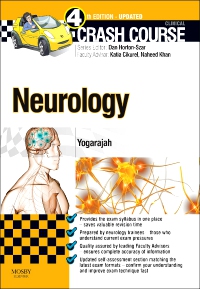
Crash Course Neurology Updated Edition: Elsevier eBook on VitalSource, 4th Edition
Elsevier eBook on VitalSource

Now $37.99
The (printed) ‘Updated Edition’ now comes with added value access to the complete, downloadable eBook version via Student Consult. Search, read and revise whilst on the move and use the interactive self-assessment to test your understanding. Crash Course - a more flexible, practical learning package than ever before.
Crash Course – your effective everyday study companion PLUS the perfect antidote for exam stress! Save time and be assured you have all the core information you need in one place to excel on your course and achieve exam success.
A winning formula now for over 15 years, each volume has been fine-tuned and fully updated, with an improved layout tailored to make your life easier. Especially written by junior doctors – those who understand what is essential for exam success – with all information thoroughly checked and quality assured by expert Faculty Advisors, the result is a series of books which exactly meets your needs and you know you can trust.
Neurology remains an integral area within the medical curriculum and clinical practice. This volume provides a logical approach to understanding the fundamental concepts that underlie common neurological conditions and reflects the exciting advances in their diagnosis and management. It offers concise coverage of the history, examination and investigations relevant to neurology; the analysis and differential diagnosis of common presenting symptoms as well as the clinical features and management of important neurological disorders.
Crash Course Neurology will provide a solid foundation not only for medical students preparing for exams and postgraduates working towards MRCP, but is also an excellent reference for those working in hospital medicine and general practice.
Newer Edition Available
Crash Course Neurology Elsevier eBook on VitalSource
-
- More than 200 tables and illustrations present clinical, diagnostic and practical information in an easy-to-follow manner
- Friendly and accessible approach to the subject makes learning especially easy
- Written by junior doctors for students - authors who understand exam pressures
- Contains ‘Hints and Tips’ boxes, and other useful aide-mémoires
- Succinct coverage of the subject enables ‘sharp focus’ and efficient use of time during exam preparation
- Contains a fully updated self-assessment section - ideal for honing exam skills and self-testing
-
- Self-assessment section fully updated to reflect current exam requirements
- Contains ‘common exam pitfalls’ as advised by faculty
- Crash Courses also available electronically!
- Online self-assessment bank also available - content edited by Dan Horton-Szar!
-
Part 1: The Patient Presents With…1. Disorders of higher cerebral function2. Disturbances of consciousness3. Headache4. Disorders of smell and taste5. Visual impairment6. Disorders of the pupils and eye movements7. Facial sensory loss and weakness8. Deafness, tinnitus, dizziness and vertigo9. Dysarthria, dysphonia and dysphagia10. Cerebellar dysphonia and dysphagia11. Movement disorders12. Limb weakness13. Limb sensory symptoms14. Disorders of gaitPart 11: Diseases and Disorders15. Dementia16. Epilepsy17. Headache and cranial facial pain18. Parkinson’s disease, other extrapyramidal disorders, and myoclonus19. Cranial nerve lesions20. Diseases affecting the spinal cord (myelopathy)21. Motor neuron disease22. Radiculopathy and plexopathy23. Disorders of the peripheral nerves24. Disorders of the neuromuscular junction25. Disorders of skeletal muscle26. Vascular diseases of the nervous system27. Intracranial tumours28. Infections of the nervous system29. Multiple sclerosis30. Systemic disease and the nervous system31. The effects of vitamin deficiencies andtoxins on the nervous system32. Hereditary conditions affecting the nervous systemPart 111: History, Examination and Common Investigations33. Taking a history34. The neurological examination35. How to write a clerking36. Further investigationsPart IV: Self-assessmentMultiple-choice questions (MCQs)Short-answer questions (SAQs)Extended-matching questions (EMQs)Patient-management problems (PMPs)MCQ answersSAQ answersEMQ answersPMP answers


 as described in our
as described in our 